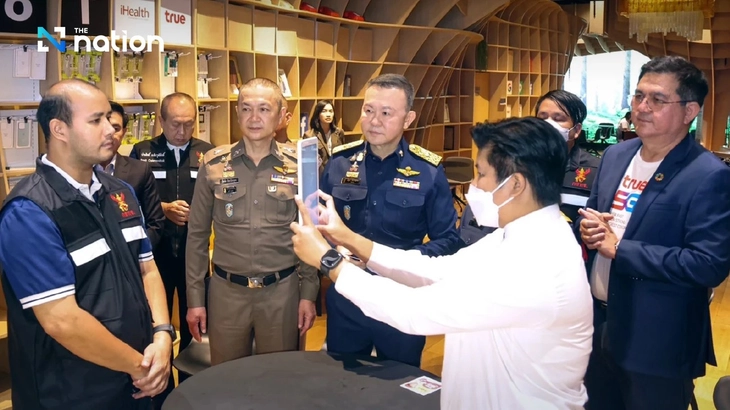
Thai citizens will be required to verify their identity using real-time facial recognition if they want to register for a SIM card - Photo: The Nation
This is seen as an important step in the effort to combat online fraud, especially cases of phone number hijacking to gain control of bank accounts.
Thailand is building a safe digital society.
According to the deputy spokesperson of the Thai government , Anukool Pruksanusak, the National Broadcasting and Telecommunications Commission (NBTC) will roll out this technology to all new subscribers, both prepaid and postpaid, as well as existing customers who need to replace their SIM cards nationwide.
This system works similarly to the facial recognition feature in banking apps when verifying identity in real time, helping to prevent fraudsters from using still images, videos , or 3D masks to impersonate people.
This addresses a previous loophole where registering a SIM card on behalf of someone else only required an ID card, The Nation reported.
With this new measure, users are required to register in person at the store, service center, or through the official app of the network provider.
All documents must be original and valid. Thai citizens must present their national identity card, foreigners must use their passports, and businesses must provide a company certificate along with the identification of their legal representative.
Mobile network operators also have a responsibility to protect personal information under Thailand's Personal Data Protection Act (PDPA).
The government emphasized that this is part of an urgent effort to "mitigate risks associated with phone numbers and build a safer digital society."
This move comes amid growing public concern over a series of scams involving SIM-swap – a type of fraud where fraudsters gain control of a user's phone number by tricking the network provider into issuing them a new SIM card.
Once they gain control of the phone number, criminals can easily intercept or receive OTP messages, thereby gaining access to bank accounts, e-wallets, and other online services.
The new measure is expected to make it more difficult for criminals to exploit loopholes in SIM registration. However, the application of this technology also raises questions about deployment costs, convenience for citizens, and the level of security of the stored facial data.
"The NBTC prioritizes consumer protection and enhancing trust in telecommunications services. This measure will help minimize the risk of cyberattacks and criminals exploiting phone numbers to commit crimes," affirmed NBTC Commissioner Natthorn Phaosunthon, while calling for cooperation from all parties to build a safe and trustworthy digital society.
Global trends
Thailand is not the only country tightening its SIM card regulations. Many countries have enacted strict rules to ensure that subscriber registration is accompanied by clear identity verification, in order to prevent fraud and cybercrime.
In India, all mobile phone subscribers are assigned an Aadhaar number – the national biometric identification system. This is a 12-digit personal identification number issued by the Unique Identification Authority of India (UIDAI) on behalf of the Government of India, given to every Indian citizen after completing a valid verification process. Each person is only entitled to one unique code in their lifetime.
This mechanism helps to limit the use of unregistered SIM cards – which are often used by cybercriminals and online scammers to conceal their identities; and creates a sustainable "tracing" mechanism, making it difficult for individuals and organizations to commit fraud via calls, messages, or online applications to remain anonymous, according to the official UIDAI portal.
In Singapore, residents, tourists , and foreign workers are only allowed to register a maximum of 3 prepaid SIM cards and must provide personal information and valid identification documents.
The government hopes this will prevent criminals from using multiple unregistered SIM cards to commit fraud or other illegal acts, according to the Singapore Business Review.
However, the policy of tightening SIM card management also faces many challenges. In Thailand alone, the nationwide deployment of a facial recognition system requires synchronized technological infrastructure, significant investment costs, and a trained workforce. People are also concerned about complicated and time-consuming registration procedures or the risk of service interruption if they lack the necessary documents.
Furthermore, legal and privacy aspects remain controversial issues. The collection and storage of biometric data such as facial or fingerprint data carries the potential risk of leakage, hacking, or misuse.
Some argue that this regulation could become a surveillance tool for the government and erode citizens' privacy.
Therefore, the effectiveness of the policy largely depends on how it is implemented, the legal framework for protecting personal data, and the balance between ensuring security and maintaining people's freedoms.
Cybercrime is booming in Asia.
According to a United Nations report, cybercrime gangs originating from China and Southeast Asia are erupting like a "digital pandemic" on an increasingly difficult-to-control scale.
In 2023, East Asia and Southeast Asia alone lost approximately $37 billion due to online scams such as fraudulent investments, cryptocurrency scams, and other forms of fraud.
The United Nations warns that while crackdowns may cause short-term disruption, these gangs are constantly adapting.
Leveraging new technologies has further complicated the situation, as they have built a completely closed ecosystem based on encrypted messaging applications, e-wallets, and cryptocurrencies to circumvent authorities.
Source: https://tuoitre.vn/thai-lan-cham-dut-ky-nguyen-sim-rac-20250826093043409.htm






![[Photo] President Luong Cuong receives Speaker of the Jordanian House of Representatives Mazen Turki El Qadi](/_next/image?url=https%3A%2F%2Fvphoto.vietnam.vn%2Fthumb%2F1200x675%2Fvietnam%2Fresource%2FIMAGE%2F2026%2F02%2F03%2F1770112220330_ndo_br_1-3704-jpg.webp&w=3840&q=75)


































































































Comment (0)